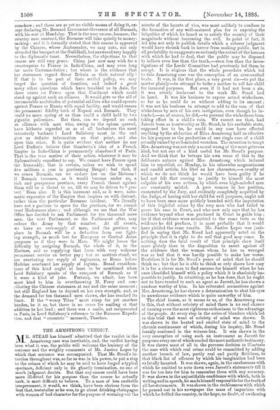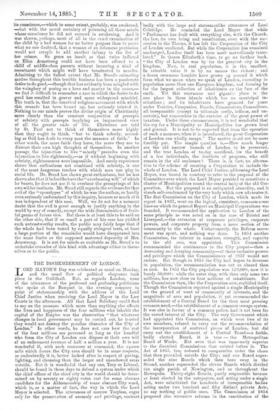THE ARMSTRONG VERDICT.
MR. STEAD has himself admitted that the verdict in the Armstrong ease was inevitable, and, the verdict having been what it was, the public will welcome the leniency of the sentence and the weighty comments of Mr. Justice Lopes by which that sentence was accompanied. That Mr. Stead's in- tention throughout was, so far as was in his power, to put a stop to the crimes of which he may be said to have forged a typical specimen, deficient only in its ghastly termination, no one of much judgment doubts. But that any muse could have been more ill-fitted for his purpose than the course he actually took, is most difficult to believe. To a man of less excitable temperament, it would, we think, have been obvious from the first that, teetotaller as he was, to go about drinking chainpagne with women of bad character for the purpose of worming out the
secrets of the haunts of vice, was most unlikely to conduce to the formation of any well-matured plan for so exposing the iniquities of which he heard as to satisfy the country of their magnitude without increasing the evil. In point of fact, it led him not only to publish details which a soberer judgment would have shrunk back in horror from making public, but in all probability to exaggerate so seriously the extent of the horrors with which he had to deal, that the public may be disposed to believe even less than the truth,—even less than the inves- tigations of the Lords' Committee had previously led them to accept. It is °bilious that the whole procedure which led to this Armstrong case was the conception of an over-excited brain. It was, in the first place, a very great sin—to put the . matter plainly—to attempt to bribe a mother to sell her child for immoral purposes. But even if it had not been a sin, it was utterly irrelevant to the work Mr. Stead had in hand. It was his business to expose actual wickedness, so far as he could do so without adding to its amount ; it was not his business to attempt to add to the sum of that wickedness by acts of his own instigation, even though he in- tended,—as, of course, he did,—to prevent the wickedness from taking effect in a child's ruin. We cannot see that, had Jarrett been as trustworthy as Mr. Stead, in his excitable state, supposed her to be, he could in any case have effected anything by the abduction of Eliza Armstrong half as effective for his purpose.as the production of one single case of a child actually ruined by evil-minded wretches. The intention to tempt Mrs. Armstrong was not only a moral wrong of the most grievous kind, but not one of a kind useful for Mr. Stead's purpose. And we think that he betrays his own sense of this in the deliberate animus against Mrs. Armstrong which induced him to republish on Monday, in his otherwise magnanimous and candid article, his libel on her character,—a cruelty of which we do not think he would have been guilty if he had not felt that craving to justify to himself the most culpable of his own actions, by which even high-minded men
are constantly misled. A poor woman in her position, exonerated by the Jury, and evidently completely acquitted by the Judge, of having sold her child for evil purposes, ought not to have been once more publicly branded with the imputation of this frightful crime by the very man who had failed to prove his case in Court, and who now only says that he has evidence beyond what was produced in Court to guide him ; for if that evidence were submitted to the same tests as the evidence he did produce, it is most probable that it would have yielded the same results. Mr. Justice Lopes was justi- fied in saying that Mr. Stead had apparently acted on the principle that it is right to do evil that good may come. In nothing does the fatal result of that principle show itself more plainly than in the disposition to assert against all the evidence that the woman whom he has so wronged was so bad that it was hardly possible to make her worse. Doubtless it is for Mr. Stead's peace of mind that he should think so ; but that he is able to think so only shows how easy it is for a clever man to find excuses for himself when he has once identified himself with a policy which it is absolutely im- possible to justify. In admitting, as he has done, that he ought not to have trusted to such an agent as Jarrett, he has shown a candour worthy of him. In his reiterated accusations against Mrs. Armstrong, he has shown a determination to shut his eyes to unwelcome evidence which is quite unworthy of him.
The chief lesson, as it seems to us, of the Armstrong case is this, that without sobriety of mind there is no real chance of turning even the most righteous enthusiasm to the advantage of the people. At every step in the series of blunders which led to this trial that want of sobriety of mind was shown. It was shown in the heated and excited state of mind to the chronic continuance of which, during his inquiry, Mr. Stead frankly confessed in the witness-box. It was shown in the very conception of using such an instrument as Jarrett for purposes every one of which needed the most authentic testimony. It was shown most of all in the perverse decision to illustrate the ease with which real crime could be committed by adding another breach of law, partly real and partly fictitious, to that black list of offences by which his imagination had been so fatally haunted. It was shown, again, in the carelessness with which he omitted to note down even Jarrett's statements till it was far too late for him to remember them with any accuracy. It was shown in the unjustifiable confidence with which, both in writing and in speech, he made himself responsible for the truth of all her statements. It was shown in the recklessness with which he poured out in his newspaper the mass of impurities with which he defiled the country, in the hope, no doubt, of awakening its conscience,—which to some extent, probably, was awakened, —but with the moral certainty of poisoning all those minds whose conscience he did not succeed in awakening. And it was shown, perhaps. most of all in the cruel examination of the child by a bad woman for no better purpose than to prove what no one doubted, that a woman of an infamous profession would not scruple to add another infamy to the list of
her crimes. So gross an insult as that twice inflicted on Eliza Armstrong could not have been offered to a child of middle-class parents without incurring a kind of resentment which might well have terminated in murder. Admitting to the fullest extent that Mr. Stead's animating motive throughout this terrible business has been a passionate desire to do good,—though that has evidently been mingled with the vainglory of posing as a hero and martyr in the cause,— we find it difficult to remember a case in which the desire to do good has resulted in graver and more widespread mischief. The truth is, that the fanatical religious movement with which this crusade has been bound up, has seriously tainted it. Nothing to our minds proves the divine origin of Christianity more clearly than the constant conjunction of precepts of sobriety with precepts implying an impassioned view of all the greater ends of life. Christians are told by St. Paul not to think of themselves more highly than they ought to think, "but to think soberly, accord- ing as God has dealt to every man the measure of faith." In other words, the more faith they have, the more they are to distrust their own high thoughts of themselves. In another passage the injunction to live "soberly " precedes even the injunction to live righteously,—as if without beginning with sobriety, righteousness were impossible. And surely experience shows that enthusiasm not combined with sobriety, is one of the most dangerous torches with which men can play in social life. Mr. Stead has shown great enthusiasm, but he has shown also that if indeed he have the "overbearing will" of which he boasts, he does not use it to overbear the promptings of his own wilder instincts. Mr. Stead still regards the evidence for that evil of the "apocalypse" of which he was the author, as hardly even seriously undermined by this inquiry, because so much of it was independent of this case. Well, we do not for a moment doubt that the evil is great enough to justify anything in the world by way of remedy, except the wide dissemination of fruit- ful germs of future vice. But there is at least this to be said on the other side, that if so small a part of his case has yielded such untrustworthy results, the public may fairly hope that if the whole had been tested by equally stringent tests, at least a large portion of the remainder would have disappeared into the same limbo as the supposed maternal depravity of Mrs. -Armstrong. It is not for minds so excitable as Mr. Stead's to undertake crusades of this kind with advantage either to them- selves or to the public.







































 Previous page
Previous page